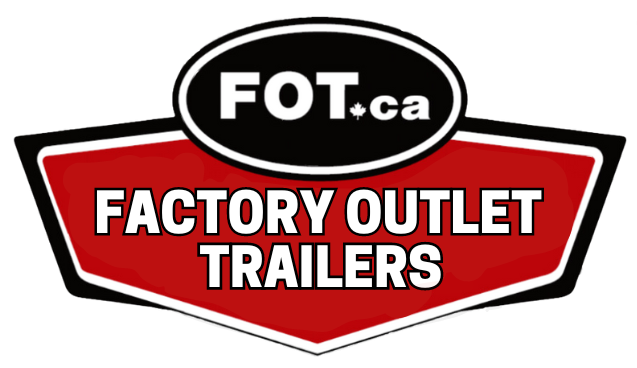When you’re hauling equipment or materials, the last thing you want is for something to go wrong with your load during transport. Properly loading and securing your trailer is crucial for safety and to guarantee that your load (and driver!) reaches its destination in one piece.
Luckily, with the right tools, accessories, and techniques, you can ensure a safe journey every time. At Factory Outlet Trailers, we can walk you through the must-have tools and tips for safe hauling, the importance of load distribution, common mistakes to avoid, and how to make your experience loading and hauling with your equipment trailer smooth, secure, and stress-free.
The Tools and Accessories You Need for Safe Equipment Hauling
Before you load up your equipment trailer for the first time, it’s important to gather the right tools and must-have accessories. These items are critical for securing your cargo and preventing any accidents on the road. From the team at Factory Outlet Trailers parts and service department, we highly recommend outfitting your new equipment trailer with:
- Wheel Chocks: A must-have for keeping your goods stable while loading and hauling, high-quality wheel chocks prevent any tools, equipment, or machinery from rolling off your equipment trailer, especially if you’re loading on uneven surfaces or an incline.
- Straps: High-quality ratchet straps are the backbone of any load-securement process. Heavy-duty straps are particularly essential for securing equipment because they allow you to tighten the load down completely and ensure nothing shifts during transport.
- Ratchets: Ratchet tie-downs offer strong, reliable tension to keep your equipment firmly in place. When used properly, they can withstand the bumps and jolts of the road to help your load stay stable and immovable throughout the twists and turns of the road.
- Tie-Down Points: Equipment trailers should have built-in tie-down points or rails to give you a secure place to attach straps. If your trailer doesn’t have these, ask the Factory Outlet Team to install additional tie-down points to help improve your load stability.
These essential accessories provide you with the ability to safely and efficiently secure your load. After making the investment to purchase the right safety supplies, always double-check that the straps are tight and the wheel chocks are in place before hitting the road.
Why Proper Weight Balance and Load Ratings Are Critical
One of the most important aspects of loading your trailer is making sure the weight is evenly distributed. Incorrect load distribution can lead to trailer swaying, which can be dangerous for you, your vehicle, and other drivers on the road. Correctly balancing the load and adhering to the weight rating will not only keep your equipment safe but will also improve the handling and braking of your towing vehicle. Here’s what you should know about load safety:
- Weight Balance: A well-balanced load keeps your trailer stable, preventing unnecessary strain on your vehicle. Distribute the weight as evenly as possible from front to back and side to side to ensure that the trailer doesn’t tip, skid, or sway while you’re driving.
- Load Ratings: Overloaded trailers can lead to equipment damage, unsafe driving conditions, or even a serious accident. Check the manufacturer’s guidelines for your trailer to ensure that you don’t exceed the maximum load capacity and respect that limit.
- Center of Gravity: Try to keep the heaviest part of your equipment near the center of the trailer, which helps maintain a low center of gravity. This reduces the risk of tipping or torsion on the axle, especially during turns or sudden maneuvers.
Common Mistakes to Avoid When Loading an Equipment Trailer
Even experienced haulers can make mistakes that compromise safety. Avoiding these mistakes will not only help ensure the safety of your equipment but will also help you avoid costly damage to your equipment trailer and potential delays. Here are some common errors to watch out for:
- Overloading the Trailer: This is one of the most dangerous mistakes you can make. Exceeding the weight limit can damage your trailer, overload your vehicle, and increase the risk of accidents. Always double-check your load weight before you hit the road.
- Poor Securing Practices: It’s tempting to rush through loading, but cutting corners here can be catastrophic. Ensure that every piece of equipment is properly tied down and that the straps are tensioned correctly. Never rely on just one strap or tie-down while hauling.
- Ignoring Trailer Maintenance: Equipment trailers, like any other machinery, require regular maintenance. Neglecting your trailer can lead to flat tires, faulty brakes, or structural issues that make hauling dangerous. Always inspect your trailer’s tires, brakes, and hitch connections before loading and hauling any trailer
- Poor Equipment Placement: Haphazardly placing equipment or leaving too much open space can result in shifting or tipping during transit, damaging not only your goods and trailer but putting other motorists at risk. Always secure every item with the appropriate straps and in the correct position.
Choose Factory Outlet Trailers for a Smooth and Secure Ride
Safe loading and securing are critical to successful equipment hauling. With the right tools and accessories, attention to load distribution, and awareness of common mistakes, you can ensure a smooth and safe journey for your equipment. Factory Outlet Trailers has everything you need to haul safely, whether you’re looking for a reliable trailer, tie-downs, or maintenance tips. From trailers to accessories, you can trust us to help you confidently transport your equipment. Visit our website or contact our team today to find the perfect solution for your hauling needs!


